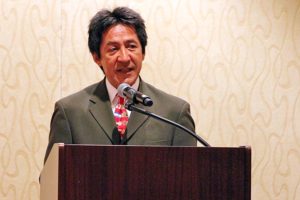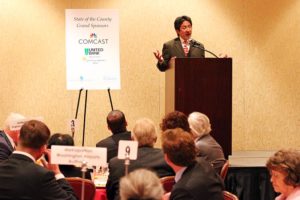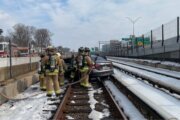 The state of the county is strong despite economic challenges, County Board Chair Walter Tejada told local business leaders earlier this week.
The state of the county is strong despite economic challenges, County Board Chair Walter Tejada told local business leaders earlier this week.
In the Board chair’s annual State of the County address, Tejada touted Arlington as a “coveted area” that people want to live and work in. However, citing the planned departure of the National Science Foundation and its 2,200+ jobs to Alexandria, and the county’s 17 percent (and rising) office vacancy rate, Tejada said the county must work to “reinvent” itself.
“Arlington is facing some economic uncertainty,” he said. “One of the worst things… is to be complacent. It’s time to reinvent ourselves once again. An important strategy of our reinvention is our focus on science and technology.”
To that end, Tejada said the county will continue to fight to keep the NSF in Ballston.
“We are profoundly disappointed, but I believe the last word has not been written on this,” he said. “We still believe Arlington is the best home for the National Science Foundation, and we hope that it stays. We will work diligently to make sure that happens.”
“It just doesn’t make sense,” he continued. “Undoing a science cluster that the federal government itself has spent two decades and quite a lot of taxpayer money building? We believe this decision needs closer scrutiny. How much are Alexandria taxpayers paying for this deal?”
 On a positive note, Tejada lauded Arlington Economic Development’s BizLaunch program which, he said, has helped more than 4,000 entrepreneurs in Arlington.
On a positive note, Tejada lauded Arlington Economic Development’s BizLaunch program which, he said, has helped more than 4,000 entrepreneurs in Arlington.
“Arlington has become a hotbed of startup technology companies,” he said. Emphasizing private sector commercial growth is important, he said, since the biggest office tenant in Arlington, the federal government, has become “unpredictable at best.”
Also part of Arlington’s “reinvention” is the Columbia Pike streetcar, Tejada said.
“The streetcar is our best transit option for Columbia Pike,” he said. “The streetcar will create that main street feel that the community wants. It will reduce pollution and congestion. And yes, it is affordable in the long term. The Pike streetcar system is equal to the cost of one Metrorail station.”
The streetcar will be funded via a commercial property tax surcharge that’s earmarked for transportation projects. The financing would not qualify for a voter referendum under state law, Tejada said, and “the plan is well within the county’s self-imposed debt limit.”
Tejada said he would not have supported the streetcar had the Columbia Pike Neighborhoods Plan not called for the preservation of affordable housing. He called on the business leaders in the room to contribute to the affordable housing effort on the Pike.
“We need your help and support,” he said. “We believe providing affordable housing for your workers makes good financial sense.”
Tejada also asked business leaders to help support the county’s effort to eliminate homelessness.
“To those for whom much is given, much is expected,” he said. “Thank you got helping us move Arlington forward.”
The start of the question-and-answer portion of the breakfast produced some intrigue. Though cut from the county’s official video of the speech (below), David DeCamp, Chair of the Board of Directors of the Arlington Chamber of Commerce, criticized the tone of the questions submitted.
“We’ve made a change here because of something that just came up last night,” he told the audience. “I took the opportunity to review the questions that were put to the county, and frankly I was a little embarrassed about the smart alecky, snarky nature of the questions. And I’m not shy about asking the hard questions… but I’m going to take some of the attitude out of it.”
DeCamp and fellow Chamber member Michael Foster proceeded to ask Tejada about financing for the streetcar, the county’s ability to achieve its affordable housing goals, lessons learned from the $1 million bus stop, and the money-losing Artisphere. On the latter point, the questioner pointed out that taxpayers subsidize the cultural facility to the tune of $40 for each person who walks in the door.
“I wonder how much it costs for each person with a library card,” Tejada replied. “In comparison, other counties are spending a lot more on the arts than we do.”
“The Artisphere is an ongoing investment in Arlington’s future,” he said. “It’s helping to building our arts and cultural community. This is a proven and documented economic development strategy that attracts the young, educated demographic who are the workforce for the technology and innovation sectors.”
“Artisphere is on its way,” he concluded. “We expect the Artisphere to become a self-sustaining organization.”
Another question dealt with the cost of streetcars and the Long Bridge Park aquatics and fitness facility.
Tejada admitted that Arlington anticipates “a continued difficult economic environment” over the next two years, which will force the county “to make some difficult choices,” including the possibility of cutting services next year. Despite that, Tejada said the county is committed to the streetcar and the aquatics center.
“These are two extremely important projects,” he said. “They represent an investment in the county’s future.”







